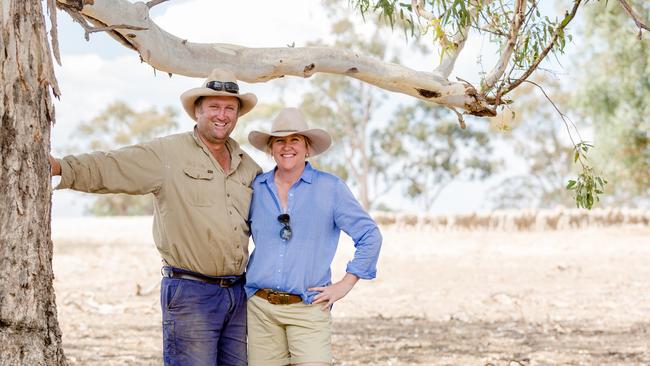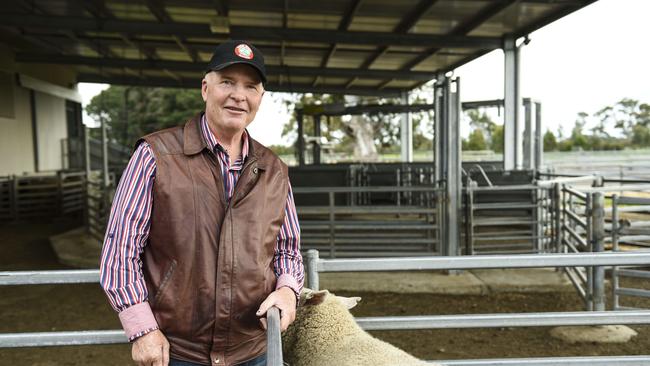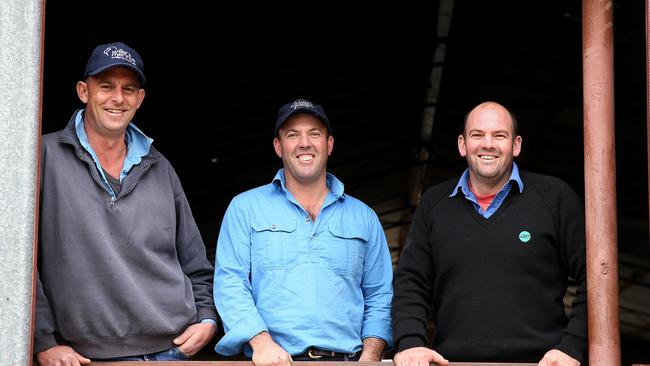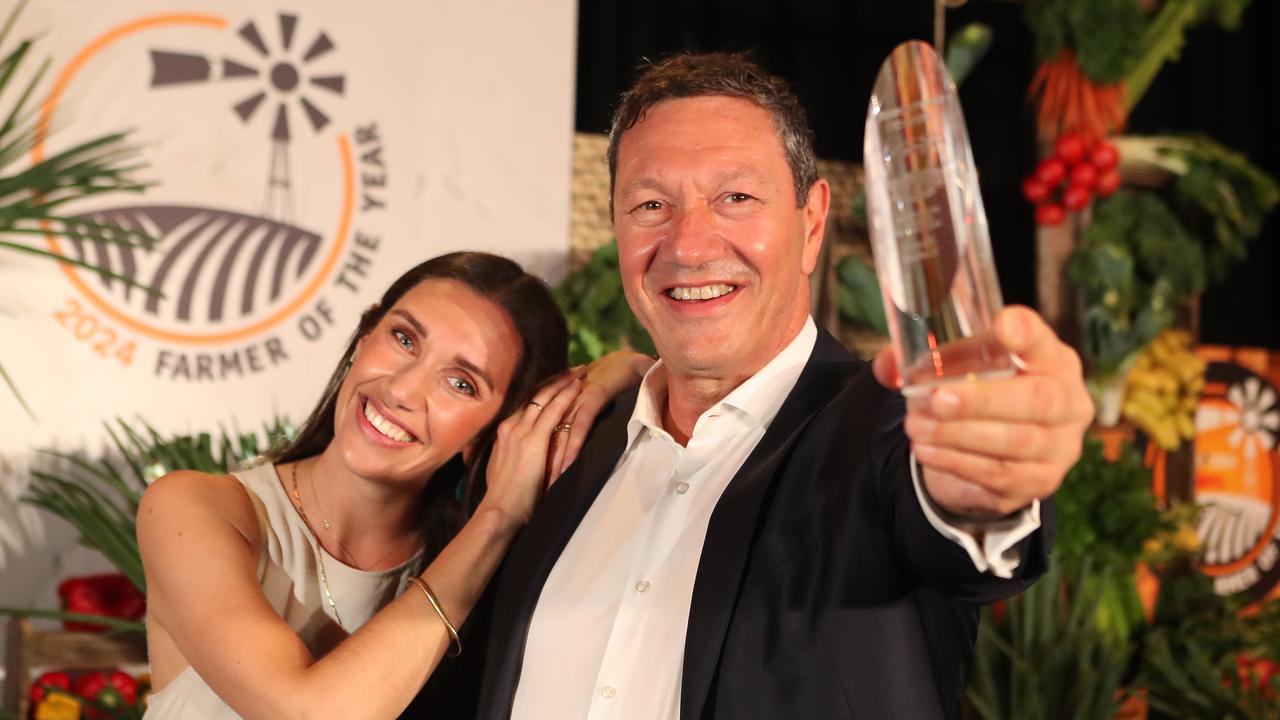Duncan and Jess Barber named The Weekly Times Coles 2019 Sheep Farmer of the Year
Metcalfe sheep farmers Duncan and Jess Barber have won the 2019 Sheep Farmer of the Year award. See who else was nominated here.
Australia’s top beef, cropping, dairy, horticulture, innovative and sheep farmers have been recognised at The Weekly Times Coles 2019 Farmer of the Year Awards. The following three growers vied for the title of Sheep Farmer of the Year.
WINNER: DUNCAN AND JESS BARBER
METCALFE, VIC

TRADITION, PROFITS GO HAND IN HAND
DUNCAN and Jess Barber’s traditional sheep enterprise has hit perfect harmony.
Using a slow and steady expansion strategy over the past 15 years, the couple has invested in a quartet of properties, multiplied sheep numbers, boosted their wool’s quality and strength, all while doubling production volume.
Unusually, they have done it with a style of Merino sheep that predates four generations of their family.
Operating under the “get big or get out” philosophy, the Barbers run 25,000 Saxon Merinos and a crossbred flock, spreading the livestock across four landholdings.
The Barbers’ original Saxon Merino flock was inherited with their main property, Coliban Park at Metcalfe in central Victoria, when it was bought by Duncan’s great grandparents in 1859.
The Barbers are forward thinkers, but their loyalty to traditional Saxons sometimes raises eyebrows. Duncan, however, believes the flock’s longevity speaks for itself.
“They’ve (sheep) been here longer than we have and they are obviously doing something right,” he says.
The sheep certainly can’t take all the credit.
The Barbers devised a clever long-term growth plan. They lease land, sell the surplus sheep at the end of each lease, then put the profit into buying land.
“Back when I came home (to the farm at 16) I worked out my parents were paying 24 per cent interest and about a 10 per cent wool levy, so 34 per cent of their gross income was coming out — we needed to get ahead by getting bigger,” Duncan says.
Another smart move has been adjusting shearing time to early autumn, to boost wool quality and lambing percentages. To control costs, they do the majority of the farm work themselves, only hiring in contractors for shearing.
Wool quality is the high note on their song sheet. Last year, the Barbers were awarded the prestigious Vitale Barberis Canonico Wool Excellence Award, which recognises ethical, environmental and high-quality wool production.
Duncan says the benefit of being a member of the VBC Wool Excellence Club is that the contracts are well-above market value and offer a premium for their Saxon-style wool, which encourages them to improve.
Expansion may mean more risk and profit, but for Duncan the bigger challenge is something he enjoys.
Their passion for excellence and comprehensive plan to build a positive future for their traditional flock clearly stands the Barbers apart, and makes them worthy winners of The Weekly Times Coles 2019 Sheep Farmer of the Year.
FINALIST: GORDON BROWN
SHELFORD, VIC

NUMBERS PUT BROWN IN THE BLACK
GORDON Brown is unashamedly a numbers man.
But in the same breath, it’s impossible not to talk about the experienced farm manager’s inherent livestock skills, which have seen him create a hugely productive sheep operation in just a few years.
It’s many small things done right that allowed his livestock operation at Shelford, in Victoria’s Western District, to switch successfully from beef to lamb production seven years ago.
Gordon manages 1220 hectares of land, running up to 3000 ewes and a small area of cropping.
Attention to detail and intolerance of unproductive sheep combined with careful selection of genetics have produced an enviable enterprise that has high lamb survival rates, low ewe mortality and high joining percentages.
With immediate meat production a goal, Gordon chose an unusual cross of Highlander-Composite sheep, drawing on attributes of high fertility, excellent mothering and impressive percentages.
Wanting even more, Gordon sought to improve the wool quality so introduced Multi Purpose Merinos to the mix in a highly unusual move.
“I always liked wool and when we had the Highlander-Composite sheep in the yards, you just wouldn’t open up the fleece because there was no point,” Gordon says.
The decision to use Glendemar Merino genetics has been a winner. Wool from the first drop of the Merino-Highlander-Composite sheep is already showing improvement.
“In just one joining there was a significant change in wool type, softness and brightness,” Gordon says.
Fleece wool tested 23 micron, and the progeny cut an extra kilogram of wool, worth twice as much as before.
While wool quality is climbing, flock productivity is holding steady, thanks to extensive monitoring of individual sheep. If a ewe has so much as a bad udder or has troubling lambing, it receives a red tag. As soon as there are enough red tags, they are sold.
“Through careful use of genetics and being diligent with our monitoring, we have ended up with a smart mob of ewes that are really productive,” Gordon says. “As a manager, that makes most owners pretty happy.”
And laughing all the way to the bank.
FINALIST: WILLERA MERINOS
HOOKE FAMILY, SERPENTINE, VIC

HOOKE, LINE AND SINKER
THE team behind Willera Merinos is hooked on finding the perfect balance between people, planet and profit.
With their home base at Serpentine in northern Victoria, the wool, meat and cropping enterprise is run by Robert and Cathie Hooke and their three adult children and their partners — Will and Kia Hooke, Karl and Kate Hooke and Arishika and Simon Coutts.
They run 1000 stud ewes, as well as 13,000 commercial ewes and 1200 hectares of cropping, on properties in three regions, across two states.
One of the Willera crew’s main accomplishments has been taking the trailblazing step away from mulesing.
Breeding towards the goal for almost two decades, they ceased mulesing more than two years ago to meet society’s demands.
Rather than a burden, they see it as an important step to ensure future security.
Will says businesses often view having to adapt to changing standards as a threat to an enterprise.
“But it is actually one of our biggest opportunities and one that we are in control of,” he says. “It just depends on how you look at it and if you put yourself in a position to get a premium.
“The aim is to breed sheep that are easier for people to manage and in line with consumer expectations around animal welfare and best-practice management.”
Economics are equally important, with the family striving to maximise returns per hectare of wool, meat and lambs.
Shrinking their environmental footprint is also a critical aim for Willera. Will says the family see it as their “responsibility to minimise our waste”.
This means making management and genetic decisions on-farm to reduce their impact.
Their efforts are paying off in spades. The stud, which normally sells 130 rams a year privately, held its first on-property auction last year with rams selling to a top of $4250 and averaging a credible $2174.
By building consideration for consumers and the planet into their production approach, Willera is kicking goals for the business, the environment and generations to come.
MORE WINNERS:


